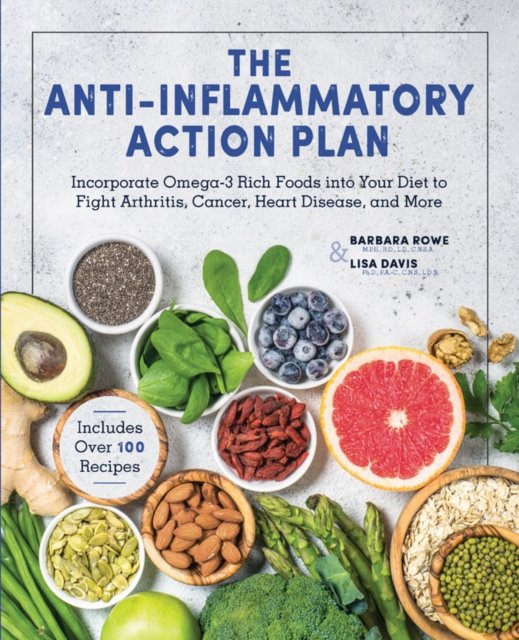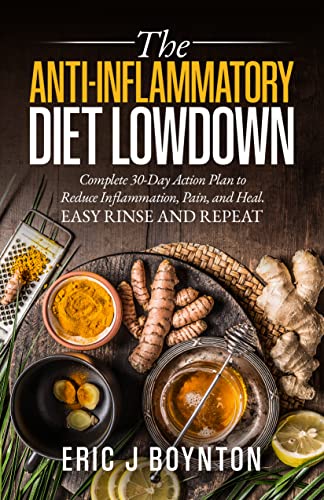The Anti Inflammatory Diet And Action Plan

Imagine waking up with a body that feels energized, not weighed down by aches and pains. The sun streams through your window, and instead of dreading the day ahead, you feel a sense of lightness, a readiness to embrace whatever comes your way. This isn't just a dream; it's a potential reality for many who embrace the principles of the anti-inflammatory diet.
This article delves into the anti-inflammatory diet, exploring its foundations, benefits, and practical steps for implementation. We'll uncover how this dietary approach can be a powerful tool for managing chronic inflammation and improving overall well-being.
Understanding Inflammation
Inflammation is a natural and essential process. It's the body's defense mechanism against injury and infection.
However, when inflammation becomes chronic – persisting for weeks, months, or even years – it can contribute to a range of health problems. These include heart disease, arthritis, diabetes, and even some types of cancer.
The Culprits Behind Chronic Inflammation
Several factors contribute to chronic inflammation. They include a diet high in processed foods, refined sugars, and unhealthy fats.
Other contributing factors can be chronic stress, lack of physical activity, smoking, and environmental toxins.
The Anti-Inflammatory Diet: A Foundation for Wellness
The anti-inflammatory diet isn't a strict, restrictive regimen, but rather a way of eating. It's a pattern that prioritizes whole, unprocessed foods known for their anti-inflammatory properties.
This dietary approach focuses on reducing the intake of pro-inflammatory foods while increasing the consumption of foods that combat inflammation.
Key Components of the Anti-Inflammatory Diet
Fruits and vegetables are cornerstones of this diet. Colorful produce like berries, leafy greens, and bell peppers are rich in antioxidants and phytonutrients.
Healthy fats, such as those found in avocados, olive oil, and fatty fish like salmon, play a crucial role. They provide essential fatty acids that help regulate inflammation.
Lean protein sources like poultry, beans, and lentils are important for tissue repair and overall health. Whole grains, such as quinoa and brown rice, offer fiber and sustained energy.
Foods to Embrace: Your Anti-Inflammatory Arsenal
Berries: Blueberries, strawberries, raspberries, and blackberries are packed with antioxidants. These compounds help neutralize free radicals that contribute to inflammation.
Fatty Fish: Salmon, mackerel, sardines, and tuna are rich in omega-3 fatty acids. They are known for their potent anti-inflammatory effects.
Leafy Greens: Spinach, kale, and collard greens are loaded with vitamins, minerals, and antioxidants. They offer protection against inflammation.
Nuts and Seeds: Almonds, walnuts, flaxseeds, and chia seeds provide healthy fats, fiber, and anti-inflammatory compounds. These can contribute to overall well-being.
Olive Oil: Extra virgin olive oil is rich in oleocanthal, a compound with similar anti-inflammatory properties to ibuprofen.
Turmeric: This spice contains curcumin, a powerful anti-inflammatory agent. It's often used in traditional medicine to manage pain and inflammation.
Foods to Limit or Avoid: Minimizing Inflammation
Processed foods are often high in unhealthy fats, refined sugars, and artificial additives. They contribute to inflammation and should be minimized.
Refined sugars, found in sugary drinks and processed snacks, can trigger inflammation in the body. Limiting intake is essential.
Red and processed meats can promote inflammation in some individuals. Moderating consumption is advised.
Excessive alcohol consumption can also contribute to inflammation. Moderation is key for overall health.
The Importance of Gut Health
A healthy gut microbiome plays a significant role in regulating inflammation. Probiotic-rich foods like yogurt, kefir, and fermented vegetables can support gut health.
Fiber-rich foods also promote a healthy gut environment. They feed beneficial bacteria and reduce inflammation.
Creating Your Anti-Inflammatory Action Plan
Start gradually by incorporating one or two anti-inflammatory foods into your daily diet. This allows your body to adjust and prevents overwhelm.
Focus on whole, unprocessed foods as the foundation of your meals. Plan meals around colorful fruits and vegetables, lean protein, and healthy fats.
Read food labels carefully to avoid hidden sugars, unhealthy fats, and artificial additives. Choose products with minimal ingredients and no added sugar.
Hydrate adequately by drinking plenty of water throughout the day. Water helps flush out toxins and supports overall health.
Manage stress through practices like meditation, yoga, or spending time in nature. Chronic stress can exacerbate inflammation.
Get regular physical activity to improve circulation and reduce inflammation. Aim for at least 30 minutes of moderate-intensity exercise most days of the week.
"The beauty of the anti-inflammatory diet is its adaptability. It's not a one-size-fits-all approach, but rather a framework you can customize to your individual needs and preferences." - Dr. Andrew Weil, a pioneer in integrative medicine.
Beyond Diet: A Holistic Approach
While diet is a crucial component, it's important to remember that managing inflammation is a holistic endeavor. Lifestyle factors play a significant role.
Prioritizing sleep, managing stress, and engaging in regular physical activity are all essential for reducing inflammation and promoting overall well-being.
The Role of Supplements
Certain supplements may be beneficial in supporting an anti-inflammatory diet. They include omega-3 fatty acids, curcumin, and probiotics.
However, it's important to consult with a healthcare professional before taking any supplements. This will ensure they are appropriate for your individual needs and health conditions.
The Anti-Inflammatory Diet: A Long-Term Investment
Adopting an anti-inflammatory diet is not a quick fix, but a long-term investment in your health. The benefits extend far beyond reducing inflammation.
Many people report improved energy levels, better sleep, clearer skin, and reduced pain after making dietary changes.
This isn't just about what you *eat*; it's about cultivating a lifestyle that supports your body's natural healing abilities.
Real-Life Success Stories
Many individuals have experienced significant improvements in their health after adopting an anti-inflammatory diet. They report reduced joint pain, improved digestion, and increased energy.
These stories serve as inspiration and demonstrate the potential of this dietary approach to transform lives.
Seeking Professional Guidance
While the anti-inflammatory diet is generally safe for most people, it's always wise to consult with a healthcare professional or registered dietitian. This will help you to ensure it's appropriate for your individual needs and health conditions.
They can provide personalized guidance and support as you navigate this dietary approach.
Remember, the journey to better health is a marathon, not a sprint. Be patient with yourself, celebrate small victories, and focus on making sustainable changes that will benefit you for years to come.
Embracing the principles of the anti-inflammatory diet can be a transformative experience. It can empower you to take control of your health and create a brighter, more vibrant future. It's a journey worth embarking on, one delicious, nutrient-rich meal at a time.












![The Anti Inflammatory Diet And Action Plan [BOOK] The Anti-Inflammatory Diet & Action Plans 4-Week Meal Plans](https://www.yumpu.com/en/image/facebook/66937773.jpg)





